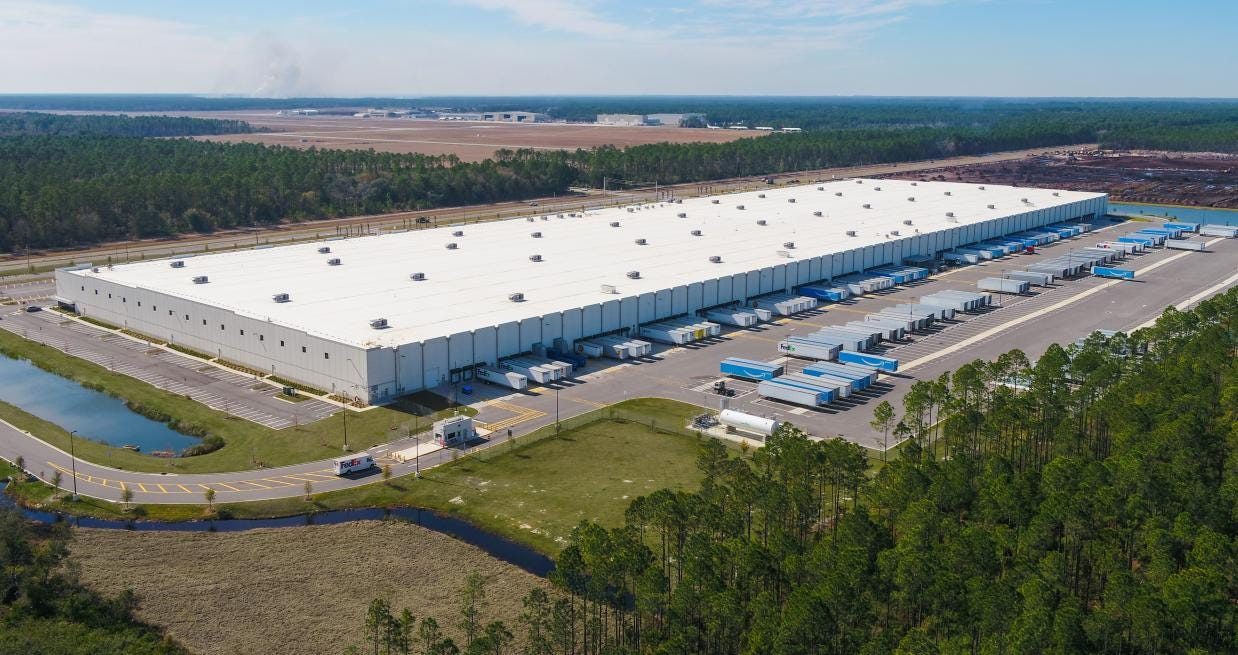Fulfillment Centers
The Word in the Wild, Year A, Proper 21
The structure, a mass as large as several box stores stacked and spread, stood blue gray against the hot September sky. The parking lot was mostly full, white striped spaces housing the frugal sedans of car payment specials. Beside it was a ditch for the runoff of rain where a few animals—egrets and turtles, mostly— fed in the muddy waters. This was a fulfillment center, the hidden structure behind the easy, everyday delivery of one click shopping.
I was there, outside of it, to see a strip of swampy forest that flanked the building. Because it is too wet, too muddy, too small, it will never be developed. Saved by its uselessness to the Economy, this small patch had become a refuge for a handful of wild creatures, holding out against the bulldozers.
There was something worth dwelling on in the contrast of the blue gray mass, promising “fulfillment,” and the small, marginal forest that provided hospitality. They represented two possibilities, two ways of measuring value and the direction of our hopes.
The building, with its constant flow of tractor trailers and blue trucks with white smiles, was an embodiment of an Economy aimed at more. More things, more of the world, more control. It represents an attempt, as old as Pharaoh, to be like god. To be god, if you aren’t one, is an exhausting enterprise. It exhausts our bodies, our relationships, and the earth itself. And yet, it is a possibility so powerful that we keep pursuing it until we reach that final reminder that we are mortal, both as individuals and a planet.
The small, marginal forest, as diminished as it was, showed a different possibility. It was a place where creatures lived in obedience to their creation, carrying on the purpose of life with which God had gifted them. Their desire was for nothing more nor less than their flourishing. The cypress trees, nob kneed in the water, were doing their work of filtering out pollution, cleaning the bayou as it poured toward the river. The oaks, pin leafed, were providing a haven for birds and food for caterpillars. The soil, wet and covered with leaves, was providing a place for earthworms and fungi, bacteria and protozoa foster life through its rich humus.
Humus is that place where we go to become human, the adamah (soil) to which the adam (human) must return to be made whole. Both Latin and Hebrew tie human life to the ground. So it is that when Jesus came to remind us how to be human, it was down toward the life of the world that his work bent in humility. God, it turns out, isn’t interested in trying to be a god. God goes down, seeking the marginal places, the small forest patches and forgotten people, where creation still lives despite all our attempts to consume it. It is there, with those who have no ambition of being gods, whose share of the world has never been enough to imagine getting more, that God seeks to do the work of renewal.
That work is a going down to go up. It is the pattern of human life in its flourishing. By turning toward the downward path, toward the humus in humility, we are able to learn to be obedient to our creator and thus become human creatures once again. And it is in that bending, that we become like God, who doesn’t try to be a god, but rather seeks out those marginal people and places where the seed of creation can still take root.
This is the truth our Epistle reading this Sunday calls us toward—a hymn to the Christ who chose the downward way and so found flourishing. In Paul’s recitation of this great hymn we are called to follow in that way, and through it to find the kind of fulfillment that can never be delivered by a blue gray van with a crooked smile.



God, it turns out, isn’t interested in trying to be a god.
This thought stopped me mid reading. So many different ways that makes sense - God’s vulnerability, our false expectations, hope for relationship.